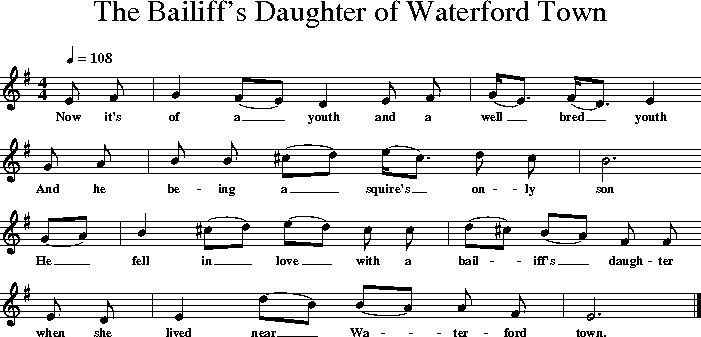Bailiff's Daughter- Roast (NS) 1937 Creighton
[From: Journal of the English Folk Dance and Song Society, Dec 1951; Noted from the singing of Walter Roast, East Chezzetcook, July 17, 1937 by Doreen H Senior and Helen Creighton. This appears in their article entitled "Folk Songs collected in the province of Nova Scotia, Canada." The other version was by Young was collected in 1933.
R. Matteson 2012, 2015]
[Note. The words of the two versions differ very little (Roast's 1937 version below has more complete lyrics), but Thomas Young's wants Verse 5, and except under the second variant tune Walter Roast's words have been printed. Both versions include the Verse 3 alluded to in the notes. Ed.]
NOTES: I have noted a Mixolydian variant of Walter Roast's tune to 'I prithee send my littel foot-boy,' or 'Mother, mother, make my bed' (see Journal No. 19, pp. 135-6, where Miss Broadwood adds a note that the tune is like one type of the 'Died for Love'
air) and I have also found versions of the tune published by Chappell, (see Popular Music of the Olden Time, Vol. I, pp. 203-4) who first, I believe, introduced 'The Bailiff's Daughter to the English public) in Westmorland and Yorkshire as a hornpipe called 'Iron Legs'. I have not seen verse 3 of the above version before. A. G. G.
Thomas Young's tune is pasticularly interesting. There is a vague resemblance of melodic line, though in a different mode, to the tune in Broadwood-Birch Reynardson's Sussex Songs, N o. 5. Verse 3 of the above text is new to me. F. M. C.
Good Dorian tunes.-A. M. F.
Both good tunes, especially Thomas Young's with its fines weep. The text also has interesting points. C. C.
Chappell published two tunes, and he describes the one resembling Walter Roast's as "the traditional tune to which it is commonly sung throughout the country ". But in Journal 27, pp. 336 both Lucy Broadwood and Frank Kidson report that they have heard, from different sources, that this ' traditional ' tune had been composed by Dr. Rimbault. See also Journal 3, p. 125 and Journal 4, p. 209, where the tune of ' The Bailiff's DauSter ' is equated with ' The Seeds of Love'. Ed.
Bailiff's Daughter- Walter Roast, (NS) 1937 Creighton

Now it's of a youth and a well-bred youth
And he being a squire's only son,
He fell in love with a bailiff's daughter
When she lived near Waterford town.
But when his parents the truth came to know
How foolishly inclined,
They bound him apprentice for Clemensford town
And they told him his business to mind.
For to stick to his books and to study the law
And to leave his true love behind.
Alas and adieu shall I never see her more,
For she still runs in my mind.
Now it happened to be in the summer time
In the merry month of May,
When she set herself down on a bank that was green
And her true love came riding that way.
Now he stepp-ed up to this pretty fair maid,
"One word, one word", he did say,
"one word, one word, kind miss", he did say
"For to ease a poor troubled mind."
"O it's where was you bred and where was you born?"
"Near Waterford town", she did say,
"Near Waterford town, kind sir", she did say,
"Where I've suffered for many's the day".
"Then if you've been born near Waterford town,
Then it's surely the truth you must know,
Of the bailiff's daughter from Waterford town
Whether she be alive or no?"
"No she's not alive for she is dead
And it's many the day ago,
No, she's not alive for she is dead,
And in her grave laid low."
"O give to me my bridle rein,
My milk-white steed let it go,
That I may go to some fine counteree
Where no one does me know."
"O do not go, kind sir", she did say,
"Come sit yourself down by my side,
It's the bailiff's daughter now that you see
And she's ready for to be your bride."
"O it's farewell woe and welcome love
It's a thousand times brighter for to see,
It's the bailiff's daughter now that I've gained
That I never more expected to see."